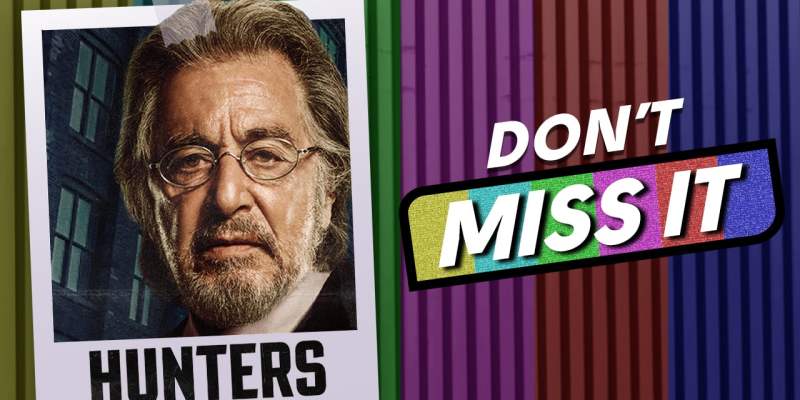Hunters offers pulp provocation, with daring and interesting results.
The basic premise of Hunters is a high-wire act. Produced by Jordan Peele (Get Out, Us) and created by freshman showrunner and dabbling actor David Weil, Hunters is effectively a Jewish revenge fantasy. Set in 1977, the show is built around a secretive cabal of Jewish operatives who identify former Nazis who have embedded themselves in American society.
The most obvious touchstone for Hunters is Quentin Tarantino’s Inglourious Basterds. The series owes a lot to Tarantino’s sensationalist alternate history, particularly its efforts to blend absurdly stylized violence with historical detail. The opening scene of Hunters sets the mood — a seemingly idyllic barbecue devolving into blood-soaked terror in what appears to be a single long take.
Writer David Weil has talked in interviews about how he was inspired by his grandmother’s stories about the horrors of the Holocaust, and the stark contrast they created between good and evil that reminded him of comic books. Indeed, it recalls Sam Mendes’ use of inspiration from his grandfather’s accounts of the First World War to create the heightened, nightmarish world of 1917.
Hunters owes its clearest debt to comic books. Protagonist Jonah Heidelbaum is introduced leaving a screening of Star Wars, discussing heroes like Batman, Superman, and Green Lantern. It’s fitting that he’s played by Logan Lerman (Noah, Fury), an actor with an alliterative name evocative of Peter Parker, Clark Kent, Bruce Banner, and so on.
The show makes a point to stress this comic book connection. A congressman dismisses a young man as a “Peter Parker pig fuck.” On visiting the home of Meyer Offerman (Al Pacino), Jonah is impressed by the opulence: “You didn’t tell me you were Bruce Wayne rich.” Offerman chides Jonah never to forget his heritage, saying, “The Torah is the original comic book.”
The pilot of Hunters is basically a superhero origin story. Like Peter Parker, Jonah is spurred to action by the murder of an elderly relative that he might have prevented. “What are you, one of your masked, caped shvantzes from your cartoons?” Offerman demands. “No. You are a boy. You are a child who could do nothing to stop the killer in his home. Who did nothing to save his grandmother.”
Hunters is populated with cartoon characters. Offerman operates a Nazi-hunting unit replete with elaborate figures like nun-with-a-gun Sister Harriet (Kate Mulvany), master of disguise Lonny Flash (Josh Radnor) and married couple Murray and Mindy Markowitz (Saul Rubinek and Carol Kane). The world of Hunters is so heightened that Al Pacino’s exuberant performance style seems practically tame.
There is a question of taste in this blend of Spider-Man and Marathon Man — just as debates rage over the tastefulness of the work of Quentin Tarantino. However, there is something appropriate in the framing of this revenge saga as a comic book adventure. After all, the comic book industry was shaped by Jewish creators like Will Eisner, Stan Lee, Jack Kirby, Joe Shuster and Jerry Siegel.
There is a debate to be had about whether characters like Superman or Spider-Man are (conceptually) Jewish. Captain America was introduced punching Hitler almost a year before the United States entered the Second World War. There is something to be said for the moral clarity with which Hunters approaches the horrors of Nazism as an uncompromised and unqualified evil.

To be fair to Hunters, the show avoids gaudy excess. Unsettling flashback sequences to the real horrors of the Holocaust are contrasted with the more colorful revenge fantasies of the present. The series invites broader questions about justice and cycles of violence, as Offerman’s group employs familiar methods against its former tormentors, whom Offerman dismisses as “vermin.”
Glimpses of unsettling reality bubble through. The pilot features the murder of a former Nazi turned “NASA scientist” at Cape Canaveral. This evokes the true story of war criminal Hubertus Strughold who experimented on epileptic children, but who was welcomed to America via Operation Paperclip so that he might help win the space race. Similarly, Offerman’s Nazi hunters are (loosely) based on real-life figures.
Hunters attempts to work through such real-life horrors in the safety of a mythic structure. There is a lot to be said for rendering such historical traumas personal, anchoring them in the mundane so that they might be parsed in such terms. In this sense, Hunters might make a nice companion piece to HBO’s upcoming adaptation of Philip Roth’s The Plot Against America — a more grounded alternate history about the rise of fascism in America.
However, there is just as much to be said for stories that do the opposite, that work through such nightmares in broader terms. These sorts of atrocities are almost beyond the scope of human comprehension. There is value in acknowledging the insanity of it all, in understanding that there comes a point when confronted with this sort of horror that the only thing to do is to find an entirely different frame of reference for it. Hunters adopts that approach.
One early scene finds young Nazi agent Travis Leich (Greg Austin) menacing a congressman who refuses to play ball with his agenda. “Dick Junior asked if I was the monster under his bed,” Travis goads. “He said he was sure there was a monster living there, but every time you would go in to check under the bed, in the closet you could never see it. Tell me, Congressman, do you see me now?”
Hunters offers a glimpse of the monsters hiding underneath all our beds — and sometimes staring us right in the face.
The entire first season of Hunters is now available to stream on Amazon Prime.
